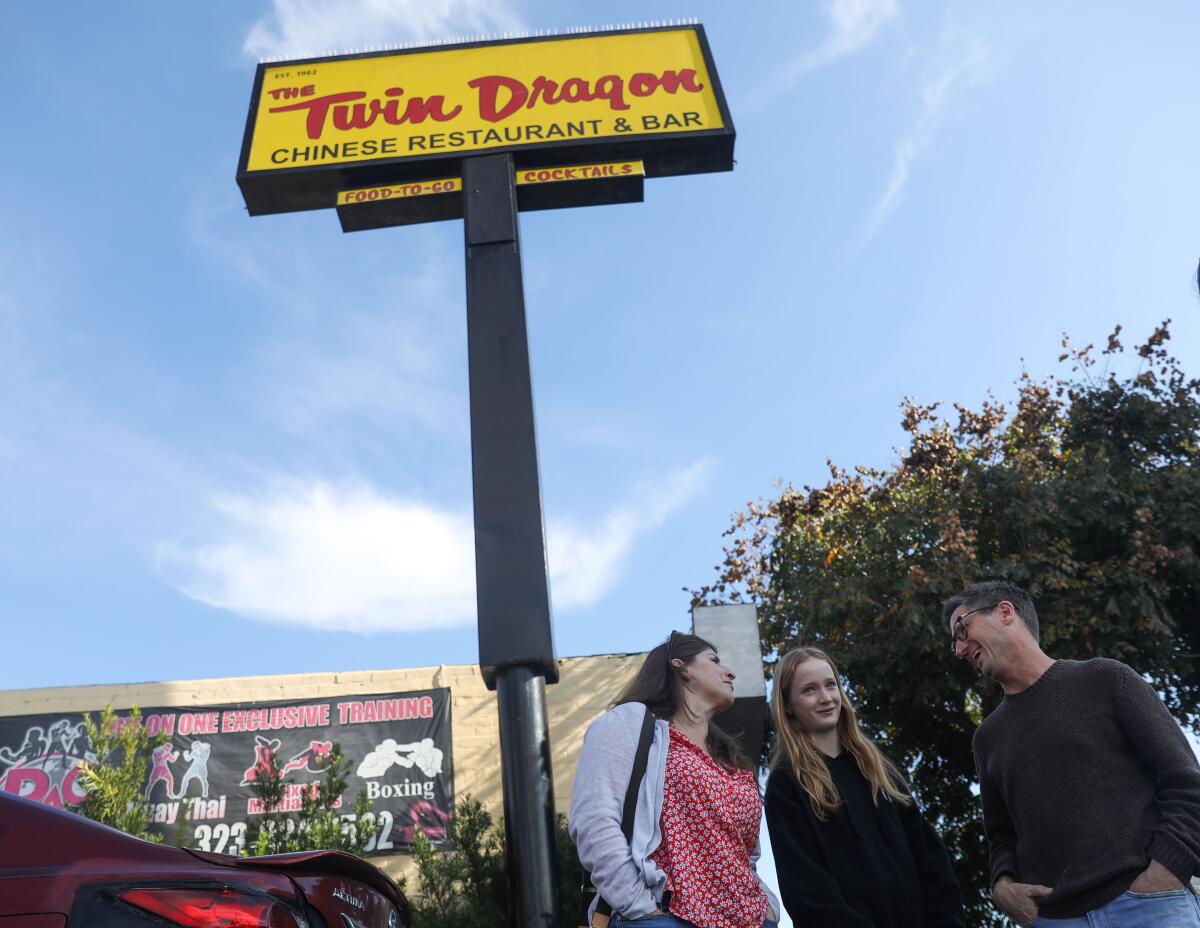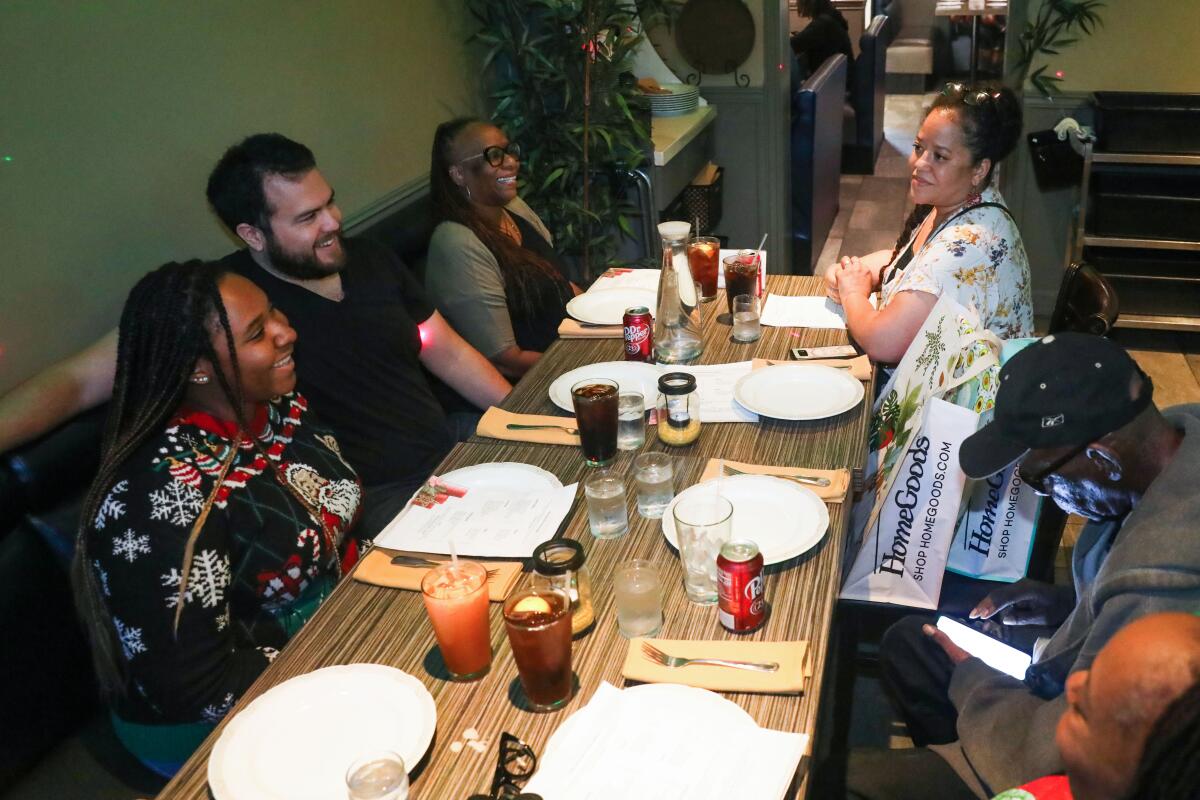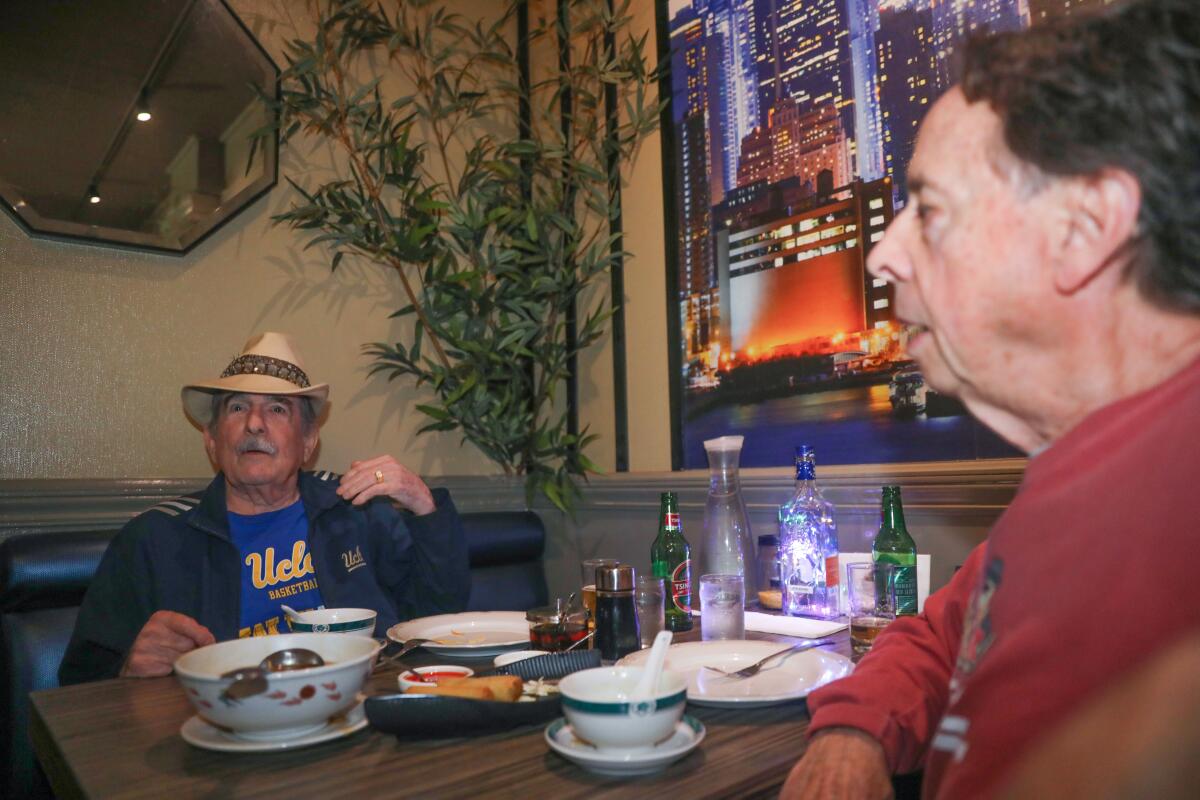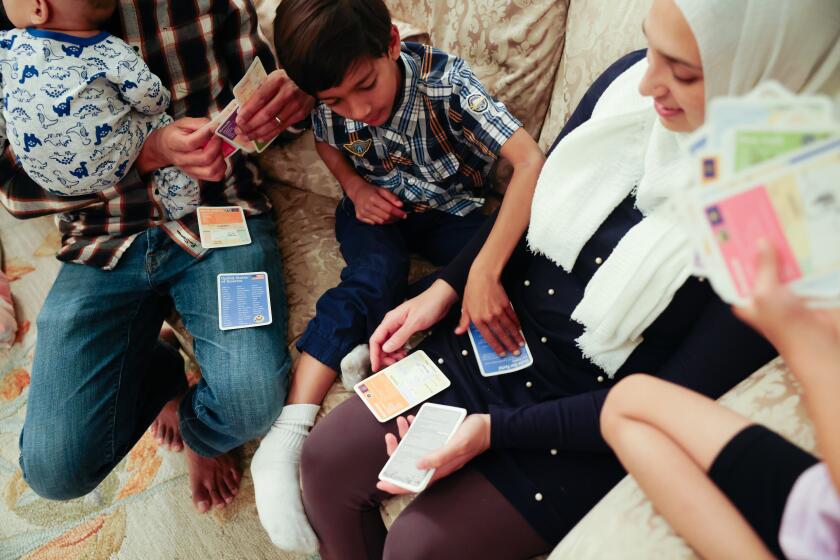At a Chinese restaurant in Pico-Robertson, it’s the usual Christmas frenzy

- Share via
Allyn Woghin was introducing her boyfriend, Robert Gleim, and his 12-year-old daughter, Lucy, to Christmas, the Jewish way.
They’d spent the morning in the San Gabriel Valley — the heart of Chinese L.A. and its cuisines — before landing at Twin Dragon in Pico-Robertson for the holiday meal.
Blending her Jewish traditions and Gleim’s Christian ones was especially meaningful because of Lucy.
And this year, with the Israel-Hamas war and the rising threat of antisemitism at home, there was an undercurrent of fear.
“It’s scarier to be in the place Jews go on Christmas,” said Woghin, 49. But the pull of barbecue pork ribs won out.
For many American Jews, Christmas simply isn’t Christmas without kung pao chicken and afternoon tickets to the latest holiday blockbuster.
For Twin Dragon, a 61-year-old landmark in the heart of Jewish L.A. and one of the oldest Chinese restaurants in the area, that makes Dec. 25 nothing short of the Super Bowl.
“It’s the busiest day of the year,” manager Amanda Tang said.

The ritual emerged around the turn of the 20th century with Jews on New York’s Lower East Side, around the same time as the Yiddish term for dining out, oysessen.
Back then, Chinese restaurants were some of the few eateries open on Christmas. Today, they’re some of the hardest to get into, with restaurants from Flatbush, N.Y., to Fairfax booked solid for holiday meals.
The Chinese feast is not a universal Jewish custom. Relatively few Orthodox Jews observe it. Nor is it particularly widespread among L.A.’s large Persian, Israeli and Russian Jewish communities.
Still, red and white takeout carriers are now as much a part of Christmas in Los Angeles as tamales and artificial snow.
Not celebrating Christmas can feel lonely. But in and around religiously diverse Los Angeles, Jews, Mulims, Hindus and others share the experience of not sharing an experience.
Many non-Jews — including atheists, Buddhists and Christians too lazy to cook — also congregate at Chinese restaurants on the holiday.
Twin Dragon has neither the Michelin listing of Chengdu Taste nor the winking, in-on-the-joke kitsch of neighboring Genghis Cohen. Its most beloved dishes are Americanized favorites, its lion statues and elaborately painted pagoda facade at once charming and a little cringe.
But that’s the point, adherents say. The key to a great Chinese meal on Christmas isn’t authenticity, or exclusivity, or glamour — although fans insist their favorite has all of the above.
Older Angelenos are strictly loyal to their neighborhood spot, longtime residents said, whether Twin Dragon, Fu’s Palace or a kosher Chinese eatery. In Pico-Robertson, the preference often stems from when someone put down roots in the area.
Most people who come to Twin Dragon on Christmas keep coming because they always have. They count their loyalty in decades. To paraphrase Tevye the Milkman, it’s tradition.
“This is something we do every year,” said Gaye Wren, whose extended family was gathered in Twin Dragon’s dark, neon-trimmed dining room for an early lunch on Christmas Day. “It was their grandmother and great-grandmother’s idea, since no one wanted to cook.”
Like many patrons, Wren’s family has been coming to the restaurant almost since it first opened in 1962. Family members travel from Inglewood, Glendale and Canoga Park. For about the last decade, they’ve made it their Christmas ritual as a Christian family, exchanging Secret Santa gifts and sharing their favorite dishes. Monday was one of their first Christmases without their beloved matriarch, Sandi Wren.
“Coming here has made it a favorite,” said Gaye Wren’s granddaughter, Jazmen Thomas, 28.
“And they’re open,” cut in her mother, Deanna Webb, 50.
“It’s consistency in a world that’s constantly changing,” Thomas said.
That’s also what brought Clifford Slobod, 81 and Kit Hudson, 77, for their annual Christmas meal of hot and sour soup and kung pao shrimp.

“We’ve been coming here for 40 years,” Slobod said.
While most patrons had come to take part in the tradition, others were surprised — and in some cases, modestly inconvenienced by it.
On Christmas Day, frustrated drivers circled the block for parking, a few abandoning their cars in the walkway alongside the disabled spot or directly in front of the curb to pick up takeout orders.
“We know it’s a thing in New York, so we literally got here right at 11 when it opened,” said LaKisha Tillman, 51. “We were the first to put in our order. People were already sitting inside, caterers picking up their orders. It’s already busy.”
Some found special significance in the ritual this year — particularly in a neighborhood where antisemitic incidents have surged since the Israel-Hamas war started.
At the same time, it was part of an irreverent and lighthearted tradition, following a Hanukkah season that was both religiously and politically fraught.
The holiday, which ended Dec. 15, celebrates Jewish victory in a war for control of Jerusalem more than 2,000 years ago. Its central miracle — the persistence of holy light through darkness — felt especially urgent to many amid the war in Gaza.
Many Jewish Angelenos shied away from public displays and celebrations out of fear of antisemitic violence, and several large public menorahs were vandalized or destroyed.
“Everything feels different this year,” said Shuli Kupchan, who was dining at Twin Dragon with another Jewish family on Christmas Eve.
For her, the Christmas ritual is a way to connect with the majority without assimilating into it.
“It’s our version of celebrating along with the rest of the world,” the educator said. “It’s a way of doing it without having a Christmas tree in our house.”
Still others were adopting the custom anew.
“I’ve actually never done it before,” said Jewish New Yorker Philip Santos Schaffer, who ate at Twin Dragon on Christmas Eve. “I’m reclaiming it.”
What tied Woghin and the Gleims to the Wren family to the Kupchans was not a particular dish or a drink or a table, but an experience passed from one generation to the next.
On Christmas Eve, a few bewildered would-be diners loitered outside under the floodlights in the Twin Dragon parking lot, stomachs growling as they scanned the paper menu and waited for a free moment to put in their order.
Hazard lights twinkled in the darkness, the sounds of laughter and car horns mingling in the air as families spilled onto West Pico Boulevard, their arms laden with grease-stained cardboard boxes and a century of holiday tradition.
“We like to destroy a restaurant — it’s our minhag,” said Molly Hoffman of Eagle Rock, who had just dined with the Kupchan family, using the Hebrew word for a Jewish custom not rooted in religious law.
“It’s something we did with our parents,” her wife, Yael Zinkow, explained, as their daughter Norah Hoffman Zinkow, 2, flounced through the parking lot in her Elsa dress and teal crown, tired but delighted at the conclusion of yet another winter festival.
“Chag sameach!” the toddler called, waving happily to a stranger — happy holiday!
More to Read
Sign up for Essential California
The most important California stories and recommendations in your inbox every morning.
You may occasionally receive promotional content from the Los Angeles Times.












